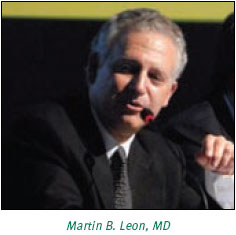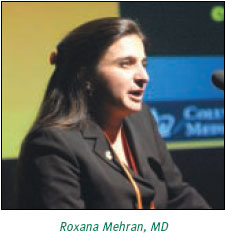|
 Thursday,
April 23, 2009 Thursday,
April 23, 2009  |
| The Changing Landscape of DES Use Patterns-Finally
Stabilizing or Still in Transition? |
 The
development of the DES use guidelines has been an involved process.It began
with the original guidelines and then searching the literature for new occurrences
in the field since 1994. Dr. Mark Lackeys at the University of Stanford
directed the compiling of evidence tables. This information was presented
to a variety of reviewers representing the different constituents. After
numerous revisions, the final guidelines were approved by the board of trustees
of the American College of Cardiology and American Heart Association. The
development of the DES use guidelines has been an involved process.It began
with the original guidelines and then searching the literature for new occurrences
in the field since 1994. Dr. Mark Lackeys at the University of Stanford
directed the compiling of evidence tables. This information was presented
to a variety of reviewers representing the different constituents. After
numerous revisions, the final guidelines were approved by the board of trustees
of the American College of Cardiology and American Heart Association.
At this time, it is uncertain if the guidelines will be revised based on
the findings of GUSTO IV. Any revisions will need to undergo the same scrutiny
as the original guidelines.
1. Have coronary procedures stabilized? In the US, coronary procedures have
stabilized, but minimal rebound was also found. And there has been a slight
increase in PCI procedures year after year, since April, 2008. 2. Has DES
penetration rebounded? There are some DES penetration differences (2.7 fold)
between countries.......
|
| A Sweet Summer or Cold Winter for DES Stents
in Patients with Diabetes Mellitus |
Coronary
heart disease (CHD) is a major cause of morbidity and mortality among patients
with diabetes mellitus (DM). Compared to nondiabetic patients, patients
with diabetes are more likely to have aggressive form of CHD, which is most
often multivessel and compromised heart function, and to have episodes of
silent ischemia. As a result of these and other factors, diabetic patients
with CHD have a lower long-term survival rate than nondiabetic patients
with CHD. Patients with diabetes comprise as many as nearly 30% of those
who undergo coronary revascularization, irrespective of surgical or percutaneous
treatment. Outcomes data, from large registries and subgroup analyses of
randomized clinical trials (RCTs) of patients undergoing revascularization,
are currently available to guide management decision making.
Sweet Summer with DES for Diabetes
Believed to account for 30% of all patients undergoing PCI, diabetic patients
are at an increased risk for complications and area high-risk population
for percutaneous
revascularization. Outcomes following percutaneous coronary intervention
(PCI) have been favorably affected by the advent of drug-eluting stents
(DES), namely paclitaxel- (PES ) and sirolimuseluting stents (SES), which
have significantly reduced the incidence of major adverse cardiac events
(MACE), as well as the rates of target-lesion revascularization (TLR) and
in-stent restenosis. ...... |
| How to Make Good Clinical Trials? |
Tutorial
Arena (Art Hall, 4F), 8:30 AM~11:00 AM
 The session for
Clinical Trials is a session dedicated to the development and dissemination
of knowledge about the design, conduct and analysis of industryor investigator
sponsored clinical trials and related health care research methodologies.
The objective of this session will be to provide a useful forum for the
discussion of biometrical, computational, philosophical, ethical, and procedural
issues arising from the design, organization, operation, analysis, and reporting
of clinical trials, to promote methodological research and the application
of sound scientific methods of intervention trials, to facilitate communication
among the various disciplines involved in the conduct of clinical trials,
to educate and inform health care researchers about the design, operation,
and analysis of clinical trials, and to promote a better understanding by
the general public of the importance of randomized clinical trials in evaluating
interventions for the prevention, diagnosis, and treatment of disease. The session for
Clinical Trials is a session dedicated to the development and dissemination
of knowledge about the design, conduct and analysis of industryor investigator
sponsored clinical trials and related health care research methodologies.
The objective of this session will be to provide a useful forum for the
discussion of biometrical, computational, philosophical, ethical, and procedural
issues arising from the design, organization, operation, analysis, and reporting
of clinical trials, to promote methodological research and the application
of sound scientific methods of intervention trials, to facilitate communication
among the various disciplines involved in the conduct of clinical trials,
to educate and inform health care researchers about the design, operation,
and analysis of clinical trials, and to promote a better understanding by
the general public of the importance of randomized clinical trials in evaluating
interventions for the prevention, diagnosis, and treatment of disease.
In this session, seven featured lectures will be presented regarding:...... |

